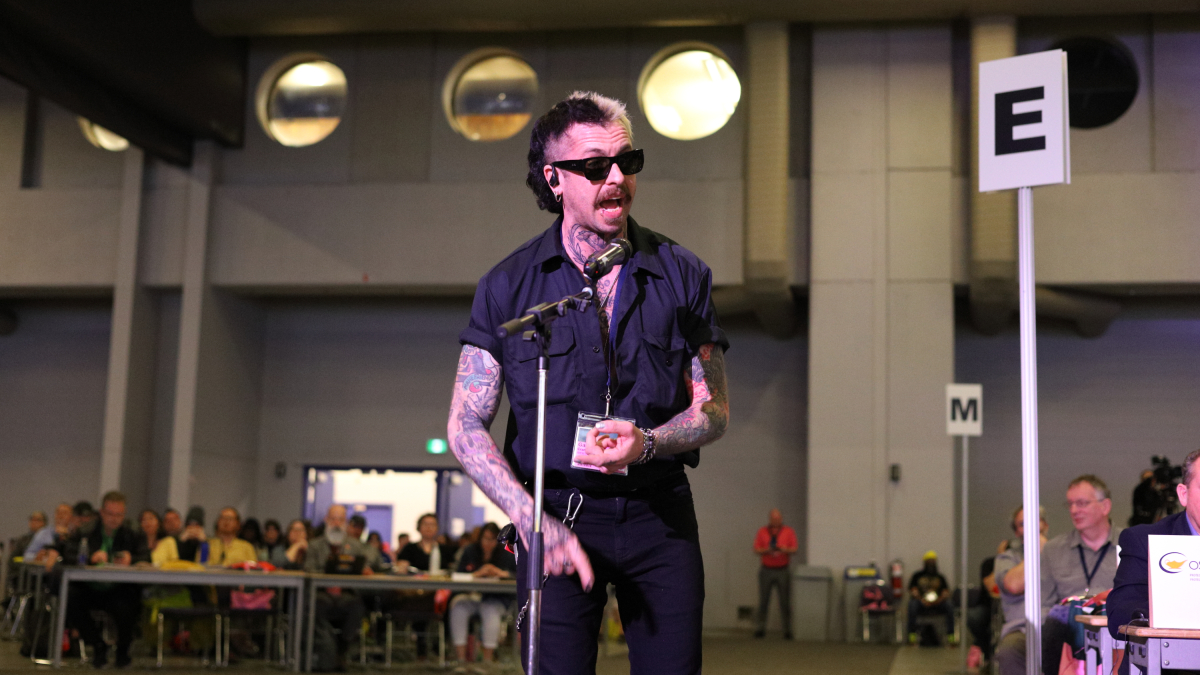Good morning!
A Canadian premier is in hot water for suggesting he wants to develop the province’s fracking industry — with or without consent from First Nations. Conservatives are making a big stink about Canada’s new passports. And another Ontario municipality is pushing back against Doug Ford’s Greenbelt plans.
It’s also been a tough week for Albertans, who are dealing with wildfires so big you can see them from space and there’s more hot weather on the way. My heart goes out to everyone in our CNO community affected by these events; I hope you and your loved ones are safe.
This week, my colleague Natasha Bulowski was in Montreal, watching from the convention floor as delegates from the country’s biggest labour organization hatched a plan to tackle climate change and create good jobs for Canadian workers. She talked to me about what she heard, why some aren’t convinced lobbying is enough to ensure an equitable transition and what happens next as the country moves to a low-carbon economy. Read on to find out more.
Lastly, before we dive in, I want to share some exciting news. Today marks the launch of a $25,000 matching campaign in support of our annual spring fundraiser. Thanks to Leonard S., Doug D. and other generous donors who joined our matching pool, all of your donations from today until May 24 will be matched dollar for dollar up to $25,000. Double your impact by making a donation today and sustain impactful journalism that drives the climate conversation forward.
As always, you can let me know what you think of this newsletter at [email protected].
Have a great weekend and stay safe!
— Dana Filek-Gibson
Looking for more CNO reads? You can find them at the bottom of this email.

Workers want in on the energy transition
Canada is moving ahead with an energy transition that will reshape its economy, and the country’s biggest labour organization wants a say in how that happens.
This week, nearly 2,200 voting delegates gathered in Montreal to hammer out a new mandate for the Canadian Labour Congress (CLC). Front and centre in several of those conversations was the need to ensure workers have a voice in the country’s transition to a low-carbon economy — one that will create rising demand for new skills and industries as well as dramatic shifts in existing ones.
My colleague Natasha Bulowski was in the room as CLC delegates debated how to address climate change. “There was no shortage of people lined up … to have their say,” she tells me. The passion from workers “was palpable and contagious, often earning delegates a standing ovation.”
The CLC’s final stance on climate change acknowledged both the dangers workers face on an overheating planet and the opportunities a low-carbon economy is already creating. Delegates voted to press the federal government for bolder climate targets as well as investments in training and the creation of well-paying union jobs. Giving workers an active role in the decision-making process around the energy transition is also part of the CLC’s new mandate, along with providing opportunities to underrepresented groups.
At the convention, delegates voiced a range of opinions, both for and against a series of proposed climate plans and resolutions. Ultimately, though, Natasha says the debate was not about whether to address climate change, but how.
“Very few delegates who spoke against the climate resolutions and climate plan were opposed to climate action,” she tells me. “In fact, most felt the motion did not go far enough or should have a clearer plan for workers.”

Now that it’s official, the CLC’s new plan comes not a moment too soon. The Trudeau government is poised to release its long-awaited sustainable jobs legislation later this year. It’s already unveiled an interim sustainable jobs plan that promises to deliver on 10 key points, including a council to promote consultation with provinces and labour unions, more money for training and skills development, better data collection on sustainable jobs, backing for Indigenous-led solutions, and a push for companies and investors to support workers.
A sustainable jobs bill will help Ottawa carry out all of these efforts, and the CLC wants to be a part of shaping the legislation. The organization is already lobbying the federal government on this front and has so far notched some wins. Budget 2023, for example, contains several investment tax credits aimed at the energy transition, Natasha explains. These “include labour requirements for employers to pay prevailing wages and create apprenticeship opportunities, which CLC lobbied hard for and applauded.”
With the new bill on the horizon, the CLC is pushing governments to “attach labour strings to ‘every sustainable support and investment,’” she says. Its goal is to ensure any new jobs “have the protections and benefits of a union, to ensure these jobs are as good or better than today's high-emitting jobs and to ensure workers have a voice in their future.”
But at the convention, not everyone was content to rely on lobbying as a force for change.
“For multiple delegates, pledging to lobby harder on these issues is not enough and doesn't provide the reassurance workers are looking for,” Natasha says. A few people she spoke to talked about the prospect of bigger collective action — like a general strike for climate, for example.
“I see a lot of words on the page calling for lobbying and I understand that that is the way that things have been done,” one first-time delegate said Tuesday as the CLC discussed its climate action plan. “We really need to look around this room and say, ‘Do you have the political will in here to make a difference?’”
As representatives go back to their unions, the CLC has its marching orders on the Hill, but what happens on the ground remains to be seen. There’s no requirement for the organization’s 51 affiliates to take up its mandate on climate change, Natasha explains, but “this plan can give them something to mobilize around.”
Already, some are raising climate issues within their own unions. “Time and time again, I was told by delegates that engaging and educating members is key,” Natasha says. “I heard lots of interesting examples of this work being done.”
More CNO reads

American fishing boats are capturing threatened Canadian salmon. The issue was a top concern for federal Fisheries Minister Joyce Murray when she met with the U.S. ambassador in March, Rochelle Baker reports.
Get outta here with your greenwashing. Marc Fawcett-Atkinson talks to ex-fossil fuel engineer Edgar (Eddie) Dearden, who is on a mission to squash marketing messages that paint natural gas as “clean.”
Let’s be Norway. Scores of electric vehicles, a nearly emissions-free grid and financial institutions that take the climate crisis seriously? Canada could learn a thing or two from the Norwegians, writes Sen. Julie Miville-Dechêne.
This could get ugly. New Brunswick Premier Blaine Higgs reportedly told a publication he would pursue fracked gas development whether or not First Nations communities gave the OK, Cloe Logan reports. Chiefs in the province say they fought against fracking before — “We’ll do it again.”
What hidden health risks are lurking in your air? A federal researcher found high levels of a cancer-causing gas in Scarborough, Ont. The discovery highlights a dangerous gap in Canada’s air quality monitoring, Marc Fawcett-Atkinson reports.


